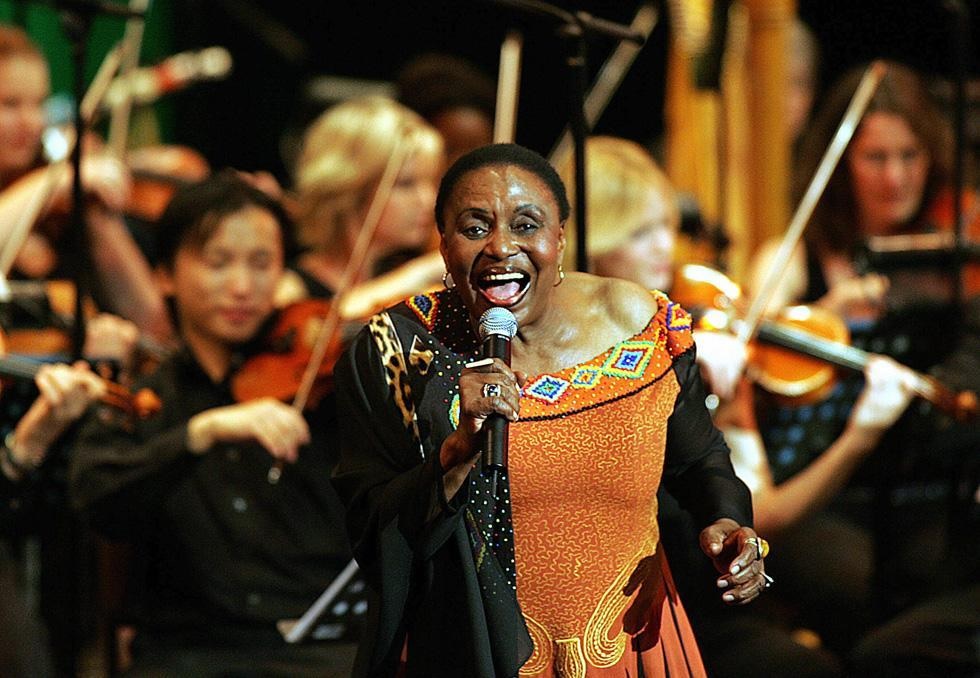
In the darkest years after World War II, the persecution of the black population in South Africa reached unprecedented levels of violence. It is those who rebel against the infamous apartheid regime who pay the price, and it takes a lot of courage to fight the white minority’s racial oppression of the black people. Among the women most active in the defence of the rights of the black majority is Miriam Makeba with her songs of joy and pain, inspired by the Bantu and Zulu tradition and the plight of her people.
On stage she sensually moves her body wrapped in sumptuous, traditional costumes. She is often provocative, drawing the audience in with a country simplicity that the whole world understands, no matter the race or language. Her natural hair, without make-up, eloquently communicates a strong sense of self, rooted in her African identity, far removed from Western notions of beauty and fashion[1].
It could not be otherwise, as those notions rule brutally over her homeland: in South Africa, since the first colonial settlements, whites make up no more than 9% of the population. Called Afrikaners, they are descendants of the Dutch or originally from England. The main ideologists of apartheid, influenced by Nazism, are Daniel François Malan[2] , Johannes Gerhardus Strijdom[3] and Hendrik Frensch Verwoerd[4]. They claim to want the various ethnic groups and their traditions to ‘grow in harmony’; in reality, they build a social, legislative and police ‘architecture’[5] based on racial discrimination[6].
Hurry up mum Hurry up mum Hurry up mum Fill the bins Here come the cops, they’re gonna get in the house, hurry Here come the cops, they’re gonna get in the house, hurry Look look look look look hurry mum, on mum, hurry Look look look hurry mum, on mum, hurry Here come the cops, they’re gonna get in the house Hurry up Here come the cops, they’ll get in the house, hurry up Look look look look hurry up mum, on mum, hurry up Look look look hurry up mum, on mum, hurry up They say look look look look hurry up mum hurry up mum[7]
The beginnings
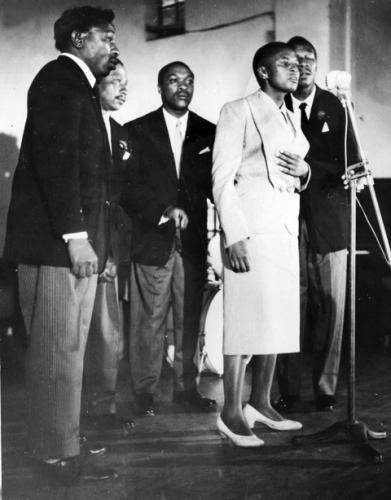
The Manhattan Brothers with Miriam Makeba[8]
Miriam Makeba, the voice of Africa[9], was born in the Johannesburg suburb of Prospect Township on 4 March 1932[10]. Her mother is an ethnic Swazi priestess, her father an aristocratic Xhosa, who dies when she is only six years old[11]. Her full name is Zenzile Makeba Qgwashu Nguvama Yiketheli Nxgowa Bantana Balomzi Xa Ufnu Ubajabulisa Ubaphekeli Mbiza Yotshwala Sithi Xa Saku Qgiba Ukutja Sithathe Izitsha Sizi Khabe Singama Lawu Singama Gqwashu Singama Nqamla Nqgithi[12].
When she is eighteen days old, her mother is arrested and sentenced to six months in prison for selling umqombothi, a craft beer illegally brewed with malt and maize flour. The family cannot afford the fine necessary to avoid a prison sentence and Miriam spends the first six months of her life in prison[13]. Growing up, she sings in the choir of Kilnerton College[14] , the black Methodist primary school she attends for eight years[15]. The girl has talent. She began by singing in church choirs, in English, Xhosa[16] (her native language[17]), Sotho and Zulu; she would later say that she learned to sing in English even before learning the language[18].
Forced to work in white people’s homes[19], at 17 she married for the first time and had a son[20]. But she never stops singing. Her repertoire is divided between ‘African Kwela’ and ‘Doo Wop’, the vocal style between Rock’n’roll and Rhythm and Blues of the 1950s. Miriam adds a strong component linked to the ‘Griots’, the African storytellers[21]. Makeba’s entry into the professional circuit took place with the Cuban Brothers singing group[22]. Subsequently with the ‘Manhattan Brothers’ she became known outside the borders of her country[23].
The members of the group are known, even before the music, for their style and their brazen display of opulence. They wear clothes bought in the best shops, always appearing refined. In this way they dictate trends for many young African men. Their fashion is a way of affirming humanity against the dehumanising social conditions of apartheid. However, the mid-1950s saw a different style of music emerge and the group’s popularity began to wane. Makeba eventually leaves the group to join the Skylarks[24], a female vocal ensemble[25].
The exile
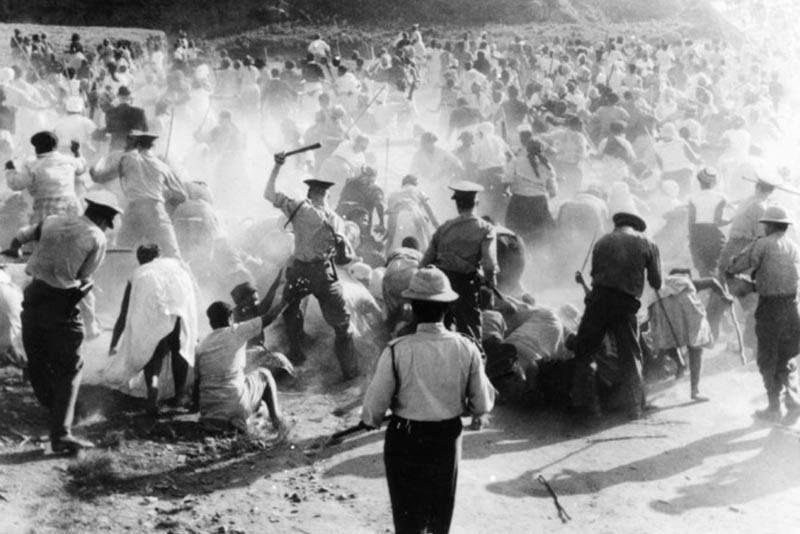
On 21 March 1960 in the black township of Sharpeville, Afrikaner policemen fired volleys at a group of unarmed African demonstrators, killing 69 people and wounding 180[26]
The international fame came in 1959, when she appeared as a guest in a documentary on apartheid, Come Back Africa, shown at the Venice Film Festival[27]. This film describes the harsh conditions in which black South Africans are forced to live. Because of her role in the film, she is forbidden to return home, not even to bury her mother. This is the beginning of her exile[28], but also of her explicit political engagement: throughout the 1960s, her music reinforces her membership in black political movements such as Black Power and Black Consciousness[29].
Her music is banned in South Africa and her passport is revoked[30]: years earlier, in ’52, the South African government introduced restrictive passport laws. During protests against these laws (led, among others, by Mahatma Gandhi), in 1960, 69 people were killed and 180 injured in what is known as the Sharpeville Massacre[31]. Among those killed were two members of Makeba’s family[32]. Miriam thus becomes stateless, but this is not a problem; she is issued passports from Algeria, Guinea, Belgium and Ghana. In total she holds nine passports and honorary citizenship in ten countries. She will only return to the country in 1990[33].
The violence against the black people in South Africa continued for another 34 years, but it did not silence Mama Africa and her testimony[34]. In 1962 she visited Kenya to support its independence from British colonial rule and raised funds for independence leader[35] Jomo Kenyatta[36]. In the same year she testifies before the UN Special Committee against Apartheid on the effects of the system, calling for economic sanctions against the National Party and an arms embargo on South Africa, which are used against women and children[37].
The success
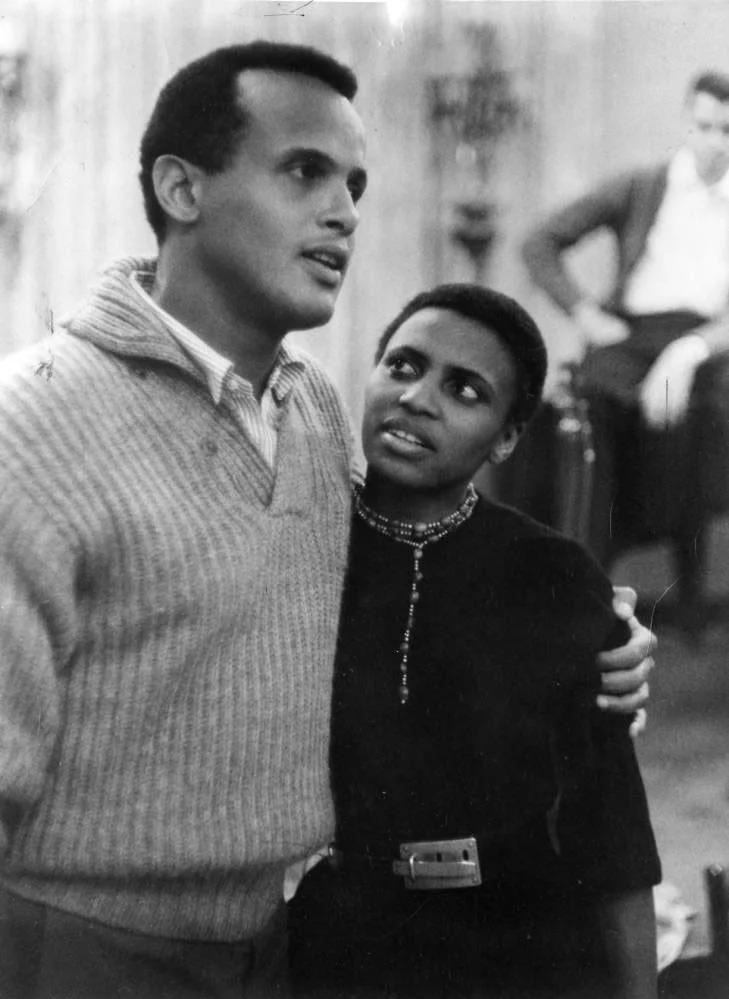
Miriam with Harry Belafonte[38]
In 1964 she married trumpeter Hugh Masekela, whom she had met during the musical King Kong[39]. Despite the divorce after only two years, the couple saved their friendship and an excellent professional relationship[40]. Unable to return to South Africa, Miriam goes to London, where she meets Harry Belafonte[41] , engaged in his eternal search for international ethnic repertoires. He is thunderstruck by Makeba’s class and takes her with him to the United States. There they soon became famous as a duo[42]. With Belafonte he sang among other things at President John F. Kennedy’s birthday party in 1962[43].
The album, An Evening with Belafonte/Makeba, won a Grammy for best folk recording in 1966[44]: the first time for an African artist[45]. The album explicitly deals with political themes related to the inequalities and social injustices suffered by black South Africans under the Apartheid regime. Living in the United States, however, is not so different from living in South Africa. If in Pretoria blacks are confined to townships, in the state of Georgia they are confined to ghettos. In the United States, in fact, segregation dates back to an 1896 Supreme Court ruling[46], in which the Court recognised a statute for railway companies in Louisiana that provided for separate carriages for whites and for blacks[47]. A historic ruling that allowed for the extension and recognition of racial segregation throughout the United States[48].
For this reason too, Miriam Makeba’s music attracts black Americans, who link her struggles against apartheid to their own[49]. African Americans see in Miriam not only what they are, but also the possibilities of what they can become, expressed through song, dance, dress, language and ideology[50]. It works: on 6 November 1962 the Special Commission on Apartheid Issues at the United Nations decides to summon her as a witness against racial persecution[51].
In 1968 she married Stokely Carmichael[52] , a leader of the Black radical movements[53] , from whom she divorced in 1979[54]. Due to its political implications, Miriam’s stay in the States becomes very difficult. Together with her husband she ends up in the crosshairs of the FBI[55]. Record projects and concerts are cancelled[56], also because she publicly accuses Washington of practising apartheid in the United States[57]. She then decides to return to Africa and finds in Guinea a second homeland[58]. She stays there for 15 years[59]. During these years she recorded some of her greatest hits such as Pata Pata, The Click Song and Malaika[60]. Released in 1957, Pata Pata reached number 12 in the American charts[61].
We changed our name to Pata Pata / That mama is how I get it / We changed our name to Pata Pata / “Pata Pata” is the name of the dance we do in the Johannesburg way. / And they start moving as soon as “Discover” starts playing – whoo / We changed our name to Pata Pata / That mama’s how I get it / We changed our name to Pata Pata / Whoo, every Friday and Saturday night is the time to “Hide” / The dance goes on all night long until the morning sun starts shining – whoo! / Aya sat wuguga sat – wo-ho-o / We changed our name to Pata Pata / That mama’s how I get it / Saguquga sath ‘- hit him! / Ah, savert ‘, there he is, hit him! / We turned around and said here’s Papa Pata[62]
‘Pata Pata’, which in the Xhosa language sounds like ‘Touch Touch Touch’, is a hymn to hugging, squeezing, touching. In times of Coronavirus, the song was mixed and partially rewritten by Benin artist Angelique Kidjo[63], becoming ‘No Pata Pata’, i.e., don’t touch, keep away. The song thus revised and corrected is a hit on radio stations in all African countries[64].
In 1985, after the death of her daughter, Miriam returned to live in Europe[65]: she moved to Belgium with her grandchildren[66], continuing to record and travel[67], and won the Dag Hammarskjöld Peace Prize. In 1990 Mandela is released after 27 years in prison and convinces her to return to South Africa[68]. At last, Mama Africa can return to her homeland and closely follow the battles that lead to the defeat of the Apartheid regime[69], and her music returns to sound free, healing the soul of a wounded nation[70].
A great friendship was born between the two, which led Makeba to support Madiba’s revolutionary projects – even those most difficult to make his people understand, such as the need for general forgiveness and a shared destiny for the new South Africa[71]. Thanks to her civic commitment, she receives awards from Unesco and other important organisations. She is received by the world’s greatest leaders, from John F. Kennedy[72] to Fidel Castro[73] , from François Mitterrand[74] to the Emperor of Ethiopia Haile Selassie[75]. During her career she made 30 albums, was included in 20 compilations and participated in several recordings by other musicians[76]. She worked with the likes of Nina Simone[77] and Dizzy Gillespie[78] , with whom she recorded an album, and with Paul Simon[79].
Her ex-husband Hugh Masekela[80] wrote the song Soweto Blues for her[81], which inspired the film Serafina! The Scent of Freedom (1992)[82] – a film about the Soweto youth riots of 1976[83]. In 2002, she participated in another documentary about Apartheid: Amandla! A Revolution in Four-Part Harmony. FAO appoints her a Goodwill Ambassador, and she receives the Otto Hahn Medal for Peace[84]. In the same year she wins the Polar Music Prize[85].
Angel, I love you, Angel I love you, Angel I should have married you, Mother I should have married you, Sister I’m defeated because I have no riches I should have married you, Angel I’m defeated because I have no riches I should have married you, Angel Money, it troubles my heart Money, it troubles my heart And what should I do? I’m your young mate I’m defeated because I have no riches I should have married you, Angel I’m defeated because I have no riches I should have married you, Angel Cupid, I think, Cupid Cupid, I think, Cupid I should have married you, Mother I should have married you, Sister I’m defeated because I have no riches I should have married you, Sister Angel I’m defeated because I have no riches I should have married you, Angelo Angelo, I love you, Angel I should have married you, mum, I should have married you, sister I’m defeated because I have no riches I should have married you, Angel I’m defeated because I have no riches I should have married you, Angel[86]
The Last Applause
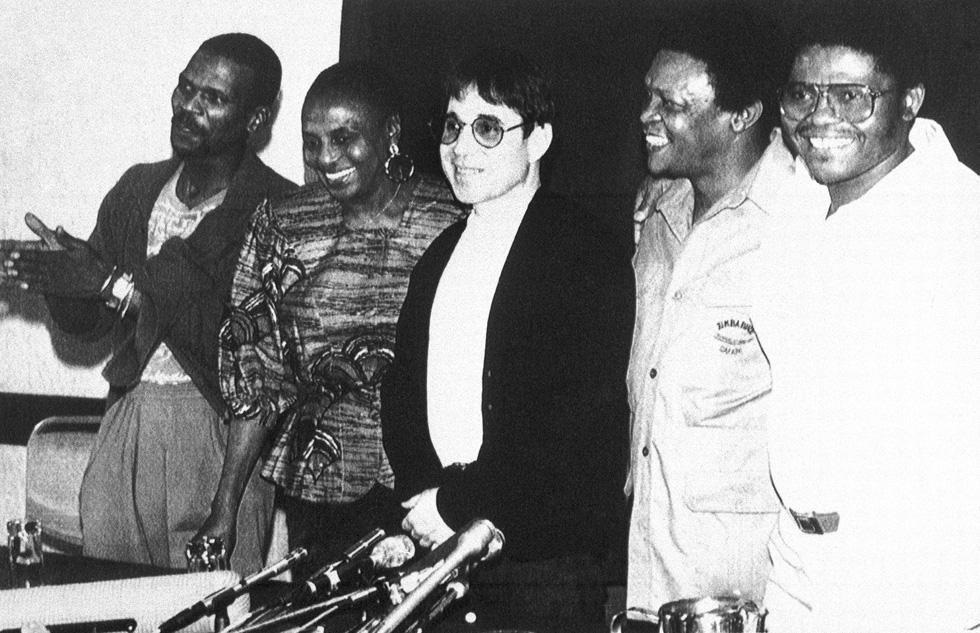
Miriam Makeba with Paul Simon (1987) in Harare, Zimbabwe[87]
She is a great fighter, and survives cancer as stubbornly as she survives a plane crash[88]. In 2005, after a triumphant tour around the world, she began to suffer from serious physical problems that forced her to move around in a wheelchair[89]. For twelve years she lived in Italy[90], and it was here that she died, in Castel Volturno, on the night between 9 and 10 November 2008. She had just finished her last performance, taking part in a concert in support of the writer Roberto Saviano[91]. She has just finished singing in memory of six young Ghanaians killed less than two months earlier by the Camorra[92].
Although debilitated by illness, Makeba still wants to honour her commitment. Clutching the microphone in her hands, motionless on a chair, she sings to the audience, composed almost exclusively of Africans living in the ghettos of shacks and old, decaying houses at the mouth of the Volturno[93]. At the end, while everyone applauds, she falls silent. She closes her eyes and faints[94]. She leaves the stage with an impressive finale[95].
Miriam Makeba dies a few minutes later in hospital of a heart attack. She was 76 years old[96]. In 2010, during a cultural and musical event organised by the Movement of Africans in Italy, Saviano said: ‘Pata Pata is a song for which she was forced into 30 years of exile. Unbelievable! It doesn’t talk about the struggle between blacks and whites, it doesn’t talk about apartheid. It’s about the desire to dance, the desire to be happy. And this is all the more frightening because it makes the message completely universal and makes this desire for peace and, above all, for fun, adhere to the desire for a different South Africa’[97].
In his condolence message, Mandela says it is ‘fitting that his last moments were on a stage, enriching the hearts and lives of others’[98]. With a warm, melodious and sincere voice[99], he used music as a weapon against Apartheid. Her songs against segregation made her a symbol of opposition to the system[100], and she leaves a legacy that encourages people to live a life of authenticity and courage[101]. As for her music, it continues to be rediscovered, from generation to generation, because its rhythm and content, so closely linked to South Africa, are in the blood of us all.
The statue dedicated to Miriam Makeba in Atteridgeville, near Pretoria in South Africa[102]
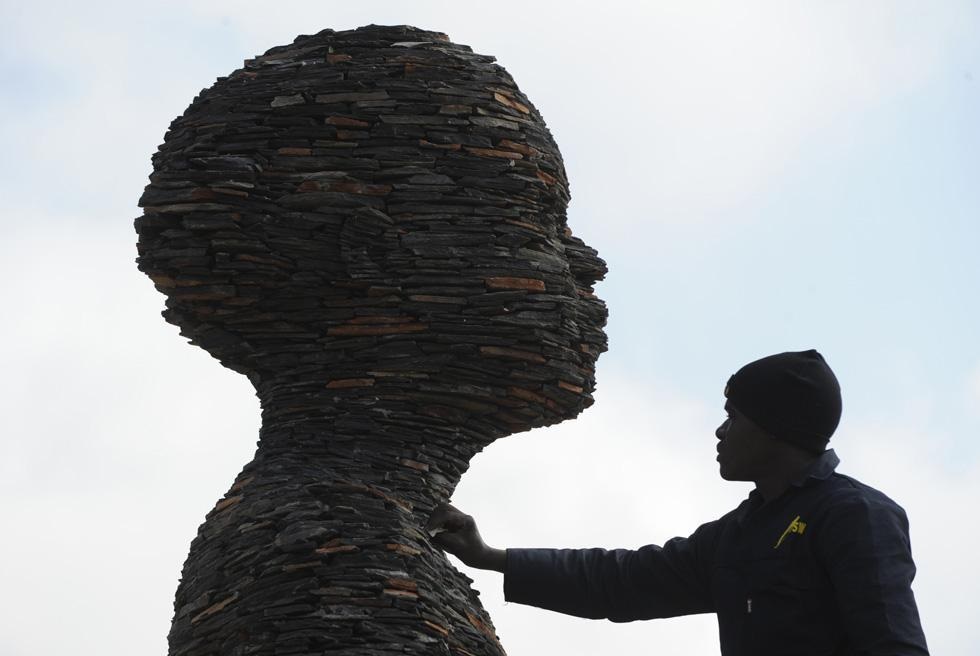
[1] https://theconversation.com/the-legacy-of-iconic-singer-miriam-makeba-and-her-art-of-activism-178230
[2] https://dacb.org/stories/southafrica/malan-daniel/
[3] https://www.sahistory.org.za/people/johannes-gerhardus-strijdom
[4] https://it.alegsaonline.com/art/120490
[5] https://it.gariwo.net/educazione/approfondimenti/apartheid-9861.html
[6] https://www.nationalgeographic.it/storia-e-civilta/2020/07/nelson-mandela-day-leroe-che-ha-combattuto-lapartheid
[7] Khawuleza mama Khawuleza mama Khawuleza mama Fihlan’ amagogogo Nang’ amapolis’ azongen’endlwini mama, khawuleza Nang’ amapolis’ azongen’endlwini mama, khawuleza Jonga jonga jonga yo khawuleza mama, iyeyiye mama, khawuleza Jonga jonga jonga yo khawuleza mama, iyeyiye mama, khawuleza
Nang’ amapolis’ azongen’endlwini mama, khawuleza Nang’ amapolis’ azongen’endlwini mama, khawuleza Jonga jonga jonga yo khawuleza mama, iyeyiye mama, khawuleza Jonga jonga jonga yo khawuleza mama, iyeyiye mama, khawuleza Bathi jonga jonga jonga yo khawuleza mama khawuleza mama khawuleza jonga jonga jonga yo khawuleza mama khawuleza mama khawuleza
[8] http://doo-wop.blogg.org/the-manhattan-brothers-a116517700
[9] https://it.gariwo.net/testi-e-contesti/diritti-umani-e-crimini-contro-l-umanita/morta-oggi-in-italia-miriam-makeba-2183.html
[10] https://mondointernazionale.com/domina/miriam-makeba
[11] https://www.palermomania.it/news/lifestyle-mondo/miriam-makeba-11742.html
[12] https://www.sanmarinortv.sm/radio/music-news-c25/miriam-makeba-la-regina-del-pata-pata-a202162
[13] https://www.unadonnalgiorno.it/miriam-makeba-la-voce-di-un-popolo-oppresso/
[14] https://theconversation.com/the-legacy-of-iconic-singer-miriam-makeba-and-her-art-of-activism-178230
[15] https://mondointernazionale.com/domina/miriam-makeba
[16] https://www.unadonnalgiorno.it/miriam-makeba-la-voce-di-un-popolo-oppresso/
[17] https://mondointernazionale.com/domina/miriam-makeba
[18] https://www.unadonnalgiorno.it/miriam-makeba-la-voce-di-un-popolo-oppresso/
[19] https://ecointernazionale.com/2021/02/miriam-makeba-una-voce-contro-apartheid/
[20] https://www.lawebstar.it/miriam-makeba-90-anni-fa-nasceva-mama-africa-la-voce-degli-oppressi-e-degli-esuli-a-causa-dellapartheid/
[21] https://biografieonline.it/biografia-miriam-makeba
[22] https://theconversation.com/the-legacy-of-iconic-singer-miriam-makeba-and-her-art-of-activism-178230
[23] https://biografieonline.it/biografia-miriam-makeba
[24] https://www.thepresidency.gov.za/national-orders/recipient/manhattan-brothers
[25] https://www.lawebstar.it/miriam-makeba-90-anni-fa-nasceva-mama-africa-la-voce-degli-oppressi-e-degli-esuli-a-causa-dellapartheid/
[26] https://it.gariwo.net/educazione/approfondimenti/apartheid-9861.html
[27] https://www.ilpost.it/2013/03/04/miriam-makeba/
[28] https://theconversation.com/the-legacy-of-iconic-singer-miriam-makeba-and-her-art-of-activism-178230
[29] https://www.europeana.eu/en/blog/miriam-makeba-mama-africa
[30] https://mondointernazionale.com/domina/miriam-makeba
[31] https://www.mandelaforum.it/eventi/21-marzo-1960-massacro-di-sharpeville/
[32] https://www.europeana.eu/en/blog/miriam-makeba-mama-africa
[33] https://www.unadonnalgiorno.it/miriam-makeba-la-voce-di-un-popolo-oppresso/
[34] https://www.amicidellanatura.it/chi-era-miriam-makeba/
[35] https://www.unadonnalgiorno.it/miriam-makeba-la-voce-di-un-popolo-oppresso/
[36] https://www.npg.org.uk/collections/search/person/mp62832/jomo-kenyatta
[37] https://www.unadonnalgiorno.it/miriam-makeba-la-voce-di-un-popolo-oppresso/
[38] https://www.europeana.eu/en/blog/miriam-makeba-mama-africa
[39] https://www.lawebstar.it/miriam-makeba-90-anni-fa-nasceva-mama-africa-la-voce-degli-oppressi-e-degli-esuli-a-causa-dellapartheid/
[40] https://mondointernazionale.com/domina/miriam-makeba
[41] https://www.singers.com/bio/7246
[42] https://www.lawebstar.it/miriam-makeba-90-anni-fa-nasceva-mama-africa-la-voce-degli-oppressi-e-degli-esuli-a-causa-dellapartheid/ ; https://www.unadonnalgiorno.it/miriam-makeba-la-voce-di-un-popolo-oppresso/
[43] https://ew.com/article/2008/11/11/miriam-makeba-i/
[44] https://www.unadonnalgiorno.it/miriam-makeba-la-voce-di-un-popolo-oppresso/
[45] https://biografieonline.it/biografia-miriam-makeba
[46] https://www.pbs.org/wnet/african-americans-many-rivers-to-cross/history/plessy-v-ferguson-who-was-plessy/
[47] https://www.oyez.org/cases/1850-1900/163us537
[48] https://ecointernazionale.com/2021/02/miriam-makeba-una-voce-contro-apartheid/
[49] https://www.europeana.eu/en/blog/miriam-makeba-mama-africa
[50] https://theconversation.com/the-legacy-of-iconic-singer-miriam-makeba-and-her-art-of-activism-178230
[51] https://ecointernazionale.com/2021/02/miriam-makeba-una-voce-contro-apartheid/
[52] https://kinginstitute.stanford.edu/encyclopedia/carmichael-stokely
[53] https://www.unadonnalgiorno.it/miriam-makeba-la-voce-di-un-popolo-oppresso/
[54] https://mondointernazionale.com/domina/miriam-makeba
[55] https://www.unadonnalgiorno.it/miriam-makeba-la-voce-di-un-popolo-oppresso/
[56] https://biografieonline.it/biografia-miriam-makeba
[57] https://www.europeana.eu/en/blog/miriam-makeba-mama-africa
[58] https://biografieonline.it/biografia-miriam-makeba
[59] https://www.ilpost.it/2013/03/04/miriam-makeba/
[60] https://mondointernazionale.com/domina/miriam-makeba
[61] https://www.unadonnalgiorno.it/miriam-makeba-la-voce-di-un-popolo-oppresso/
[62] Saguquga sathi bega nantsi Pata Pata
Hiyo mama hiyo ma nantsi Pata Pata
Saguquga sathi bega nantsi Pata Pata
“Pata Pata” is the name of a dance we do down Johannesburg way.
And everybody starts to move as soon as “Pata Pata” starts to play – whoo
Saguquga sathi bega nantsi Pata Pata
Hiyo mama hiyo ma nantsi Pata Pata
Saguquga sathi bega nantsi Pata Pata
Whoo, every Friday and Saturday night it’s “Pata Pata” time
The dance keeps going all night long till the morning sun begins to shine – hey!
Aya sat wuguga sat – wo-ho-o
Saguquga sathi bega nantsi Pata Pata
Hiyo mama hiyo ma nantsi Pata Pata
Saguquga sath’ – hit it!
Aah- saguquga sath’ – nantsi – hit it!
Saguquga sathi bega nantsi Pata Pata
[63] https://shorefire.com/roster/angelique-kidjo/bio
[64] https://www.sanmarinortv.sm/radio/music-news-c25/miriam-makeba-la-regina-del-pata-pata-a202162
[65] https://www.palermomania.it/news/lifestyle-mondo/miriam-makeba-11742.html
[66] https://www.europeana.eu/en/blog/miriam-makeba-mama-africa
[67] https://mondointernazionale.com/domina/miriam-makeba
[68] https://www.europeana.eu/en/blog/miriam-makeba-mama-africa
[69] https://www.unadonnalgiorno.it/miriam-makeba-la-voce-di-un-popolo-oppresso/
[70] https://www.amicidellanatura.it/chi-era-miriam-makeba/
[71] https://biografieonline.it/biografia-miriam-makeba
[72] https://www.jfklibrary.org/learn/about-jfk/life-of-john-f-kennedy
[73] http://www.fidelcastro.cu/en/biografia/fidel-castro-revolutionary-soldier
[74] https://www.elysee.fr/en/francois-mitterrand
[75] https://ethiopiancrown.org/biography-emperor-haile-selassie-i/
[76] https://mondointernazionale.com/domina/miriam-makeba
[77] https://www.ninasimone.com/biography/
[78] https://www.ijc.uidaho.edu/gillespie_dizzy/bio.html
[79] https://www.paul-simon.info/PHP/biography.php
[80] http://hughmasekela.co.za/biography/
[81] https://biografieonline.it/biografia-miriam-makeba
[82] https://www.unadonnalgiorno.it/miriam-makeba-la-voce-di-un-popolo-oppresso/
[83] https://ew.com/article/2008/11/11/miriam-makeba-i/
[84] https://www.unadonnalgiorno.it/miriam-makeba-la-voce-di-un-popolo-oppresso/
[85] https://www.polarmusicprize.org/laureates/miriam-makeba/
[86] Malaika, nakupenda Malaika Malaika, nakupenda Malaika Ningekuoa mali we, ningekuoa dada
Nashindwa na mali sina we Ningekuoa Malaika Nashindwa na mali sina we Ningekuoa Malaika
Pesa zasumbua roho yangu Pesa zasumbua roho yangu Nami nifanyeje, kijana mwenzio
Nashindwa na mali sina we Ningekuoa Malaika Nashindwa na mali sina we Ningekuoa Malaika
Kidege, hukuwaza kidege Kidege, hukuwaza kidege Ningekuoa mali we, ningekuoa dada
Nashindwa na mali sina We Ningekuoa Malaika Nashindwa na mali sina We Ningekuoa Malaika
Malaika, nakupenda Malaika Malaika, nakupenda Malaika Ningekuoa mali we, ngekuoa dada
Nashindwa na mali sina we Ningekuoa Malaika Nashindwa na mali sina we Ningekuoa Malaika
[87] https://www.ilpost.it/2013/03/04/miriam-makeba/paul-simon-4/
[88] https://biografieonline.it/biografia-miriam-makeba
[89] https://www.corriere.it/spettacoli/08_novembre_10/moret_miriam_makeba_b831e66a-aef0-11dd-bbcd-00144f02aabc.shtml
[90] https://makebatribute.wordpress.com/2010/03/02/saviano_video/
[91] https://pantheon.world/profile/person/Roberto_Saviano/ ; https://biografieonline.it/biografia-miriam-makeba
[92] https://vittimemafia.it/18-settembre-2008-castel-volturno-ce-strage-di-san-gennaro-morirono-6-giovani-ghanesi-ibrahim-alhaji-karim-yakubu-qawangaq-julius-francis-kuame-antwi-sonny-abu-justice-eric-affun-yeboa-wiafe-kwadwo-ow/
[93] https://www.corriere.it/spettacoli/08_novembre_10/moret_miriam_makeba_b831e66a-aef0-11dd-bbcd-00144f02aabc.shtml
[94] https://www.corriere.it/spettacoli/08_novembre_10/moret_miriam_makeba_b831e66a-aef0-11dd-bbcd-00144f02aabc.shtml
[95] https://www.palermomania.it/news/lifestyle-mondo/miriam-makeba-11742.html
[96] https://www.corriere.it/spettacoli/08_novembre_10/moret_miriam_makeba_b831e66a-aef0-11dd-bbcd-00144f02aabc.shtml
[97] https://makebatribute.wordpress.com/2010/03/02/saviano_video/
[98] http://news.bbc.co.uk/2/hi/africa/7719793.stm
[99] https://biografieonline.it/biografia-miriam-makeba
[100] https://www.unadonnalgiorno.it/miriam-makeba-la-voce-di-un-popolo-oppresso/
[101] https://theconversation.com/the-legacy-of-iconic-singer-miriam-makeba-and-her-art-of-activism-178230
[102] https://www.ilpost.it/2013/03/04/miriam-makeba/a-worker-repairs-a-statue-representing-s/
Leave a Reply